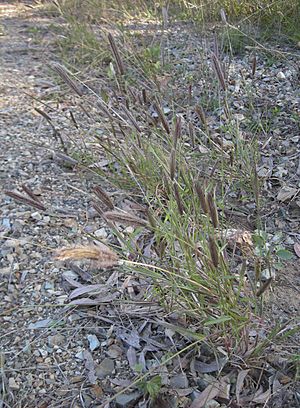Feather fingergrass facts for kids
Quick facts for kids Feather fingergrass |
|
|---|---|
 |
|
| Scientific classification | |
| Genus: |
Chloris (plant)
|
| Species: |
virgata
|
| Synonyms | |
|
|
Chloris virgata is a type of grass that has a few different common names. You might hear it called feather fingergrass, feathery Rhodes-grass, or feather windmillgrass. It's a tough plant that can grow in many warm parts of the world.
Where Feather Fingergrass Grows
Feather fingergrass is originally from many warm places around the world. These include parts of Europe and Asia (Eurasia), Africa, and North and South America. It's also found in many other places where it wasn't originally from. This means it has spread and now grows naturally there. Some of these places include Hawaii, Australia, and the Canary Islands.
This grass is very strong and can grow in many different kinds of places. You can often find it in areas that have been disturbed, like next to roads or railroad tracks. It also grows in cultivated farmland, which are fields where crops are grown. In some areas, people consider it a weed. For example, it can grow in fields of alfalfa in the southwestern United States, which can be a problem for farmers.
What Feather Fingergrass Looks Like
Feather fingergrass is an annual grass. This means it completes its whole life cycle, from seed to flower to seed, in just one year. It usually grows up to about half a meter tall, which is about 20 inches.
Sometimes, this grass grows in clumps or "tufts." It might also spread using special stems called stolons. These stolons grow along the ground and can start new plants.
The top part of the plant, where the seeds are, is called the inflorescence. It looks like a group of 4 to 20 finger-shaped branches. Each of these branches can be up to 10 centimeters (about 4 inches) long. On each branch, there are about 10 tiny seed clusters called spikelets per centimeter. Each spikelet has one part that can make new seeds (a fertile floret) and one or two parts that cannot (sterile florets).

